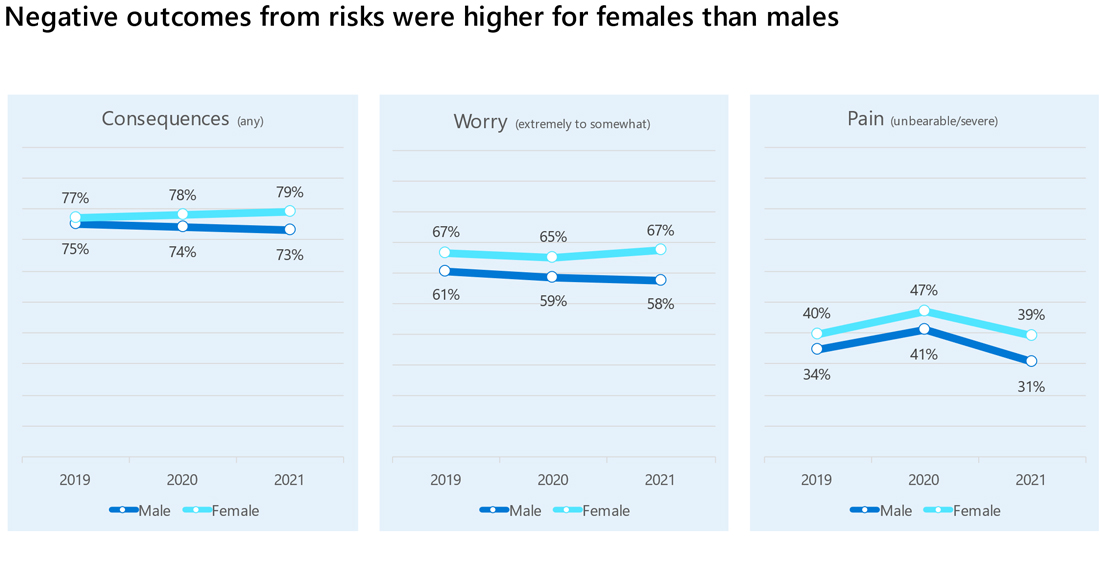As part of international Safer Internet Day, in the spirit of the theme Together for a Better Internet, Microsoft is releasing the latest results from its sixth annual study Civility, Safety and Interaction Online – 2022, and a newly updated Digital Civility Index (DCI) score.
The survey, conducted in 22 countries, polled teens aged 13-17 and adults aged 18-74 about their exposure to 21 online risks across four categories (reputational, behavioral, sexual and personal/intrusive[1]), their experiences of life online (including during the pandemic) and how interactions in those areas impacted their perception of online civility. Responses to the survey generate a DCI score, which works much like a golf score: the lower the index reading (on a scale from zero to 100), the lower respondents’ risk exposure and the higher the perceived level of online civility among people in that country.
Notably, this year’s global DCI score stands at 65%, which is the best it has been since the survey began in 2016. This is also an improvement of 2% since 2020, despite perceptions of online civility deteriorating one year into the global pandemic. To find your country’s DCI score and other key statistics, check out our country-level data summaries.
The following are other key takeaways from this year’s results, marking areas where we intend to drive further progress towards a safer, more civil internet through public-private partnerships and consumer education campaigns.
Perceptions of online safety vary by gender, with females experiencing greater negative interactions
This year’s DCI improvement was led by teen boys and male respondents, who generally reported being less exposed to online risks than female respondents. For instance, teen boys saw a 5% decrease in trolling and unwanted sexting, and a 3% decrease in hate speech compared to last year’s results.
Teen girls and women respondents, on the other hand, reported being both more exposed to online risks and feeling more severe consequences as a result. Females experienced almost 60% of all risks reported in 2021, an all-time high, and were also more likely to have experienced consequences, worry or pain due to being treated uncivilly.
 This year’s learnings also underscore the importance of data – the quality, availability and use of gender-disaggregated data to better understand trends, to encourage informed policy dialogue, and to track progress in addressing the lived experience of girls and women. While data plays an increasingly important role in our lives, access to quality data on gender is sometimes hard to come by. That’s why, for the first time since Microsoft launched its digital civility project, we’ve decided to make public the data that has underpinned this research as part of Microsoft’s leadership in the UN Generation Equality Forum.
This year’s learnings also underscore the importance of data – the quality, availability and use of gender-disaggregated data to better understand trends, to encourage informed policy dialogue, and to track progress in addressing the lived experience of girls and women. While data plays an increasingly important role in our lives, access to quality data on gender is sometimes hard to come by. That’s why, for the first time since Microsoft launched its digital civility project, we’ve decided to make public the data that has underpinned this research as part of Microsoft’s leadership in the UN Generation Equality Forum.
This partnership is one example of the multi-stakeholder collaboration we have undertaken on digital safety. Microsoft collaborates with advocates, industry partners and governments worldwide to develop solutions and promote effective public policies that help protect people online. It is our hope that providing access to this data will prompt new projects and research. As a range of governments globally look to take regulatory steps to enhance the safety of the online environment, we continue to advocate for holistic, whole-of-society approaches, recognizing that digital safety is a shared responsibility.
Education is critical to making the internet a safer place for everyone
This year, we also checked in on people’s perceptions of what’s needed to help create a safer online environment for everyone. Nearly 9 out of 10 respondents, across all genders and age groups, stated that there’s a need to better educate people on how to make the digital world safer.
Providing access to online safety resources and tools has been a key part of Microsoft’s approach to digital safety: We want to empower our users and their families to make safe choices. To that end, Microsoft continues to offer new guidance to consumers for staying safe online, based on our research and input from stakeholders. For instance, in June 2021, we released digital safety essentials to support teachers and students to encourage critical online safety discussions in the classroom environment.
To celebrate Safer Internet Day 2022, Minecraft has launched a new adventure that helps students learn how to recognize common threats on the internet and build strategies to protect themselves and their information. The adventure, CyberSafe: Home Sweet Hmm, is available for free in Minecraft: Education Edition. The game-based learning experience is a fun and creative way for students ages 7-12 to learn about online safety while playing in their favorite blocky universe. To learn more, visit Xbox Wire.
At Microsoft, we’ve also benefited from hearing directly from young people on their experiences of digital safety. In August last year, we hosted a virtual summit for our 2021 Council for Digital Good: a group of US-based teens aged 13-17. Over four days, we talked through their views on the state of online civility, as well as key online safety topics including cyberbullying, terrorism, privacy and hate speech. Themes and observations from the summit included the importance of authenticity, positivity, diversity and balance, as well as taking personal accountability for one’s words and actions online, as well as in real life.
Call to action
To help build a safer internet together, we continue to encourage people to take the Digital Civility Challenge, drawing on four common-sense principles to help grow compassion, empathy and kindness when using the Internet:
- Live the Golden Rule by acting with empathy, compassion and kindness in every interaction, and treating everyone you connect with online with dignity and respect
- Respect differences, honor diverse perspectives and, when disagreements surface, engage thoughtfully, avoiding name-calling and personal attacks
- Pause before replying to things you disagree with, and don’t post or send anything that could hurt someone else, damage a reputation or threaten someone’s safety
- Stand up for yourself and others by supporting those who are targets of online abuse or cruelty, reporting threatening activity and preserving evidence of inappropriate or unsafe behavior
To close, we’d also like to share the creative manifesto from our 2021 Council for Digital Good, who have shared their collective safety commitment through song lyrics:
The internet is crazy
The internet is big
Everyone gets it
We’ve set boundaries
To keep everything calm
Here is our Manifesto song
We pledge to be kind
Look from others’ perspectives
We will accept it
If we are corrected
If something doesn’t feel right
To us
We’ll tell someone we trust
(And that is a must!)
We don’t spread or accept any hate
Because sometimes a “sorry” can be too late
This is what we created
Different perspectives made it
This is to ensure safety for all
A better online world, we hope to install
Please also visit our resources page for additional advice and guidance on online safety issues. Be sure to also follow us on social media at Microsoft Safer Online via Facebook and Twitter.
[1] Reputational – “Doxing” and damage to personal or professional reputations; Behavioral – Being treated meanly; experiencing trolling, online harassment or bullying; encountering hate speech and microaggressions; Sexual – Sending or receiving unwanted sexting messages and making sexual solicitations; receiving unwanted sexual attention and being a victim of sextortion or non-consensual pornography (aka “revenge porn”); and Personal/intrusive – Being the target of unwanted contact, experiencing discrimination, swatting, misogyny, exposure to extremist content/recruiting, or falling victim to hoaxes, scams or fraud.

